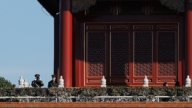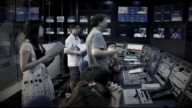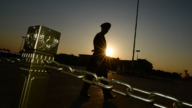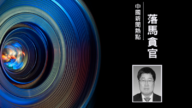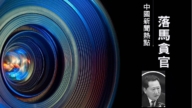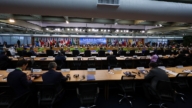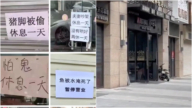【新唐人2014年01月27日訊】習近平最近又擔任了中共最新設立的「國家安全委員會」主席,不久前,他還出任了「全面深化改革領導小組」組長職位。這對中國未來局勢有何影響?請看學者的分析。
據中共官媒《新華社》報導,在1月24號召開的中央政治局會議上,習近平出任中央國家安全委員會主席,李克強、張德江任副主席。
「國安委」作為中共關於國家安全工作的決策和議事協調機構,向中央政治局、中央政治局常務委員會負責,統籌協調涉及國家安全的重大事項和重要工作。
至此,習近平集中共總書記、中國國家主席、中央軍委主席、「國安委」主席及「深化改革領導小組」組長的權力於一身,完成了權力的全面壟斷。
香港《開放》雜誌編輯蔡詠梅:「現在國安委的最重要作用是讓總書記集權,把權力高度集中在總書記手中。周永康的權利還加上了國防、外交這樣的權利,集中起來,全部在習近平手中。」
香港《開放》雜誌編輯蔡詠梅表示,中共「紅二代」有更強烈的江山意識,習近平在太子黨中有廣泛的人脈,他結束了胡、溫的「九個總統」時代。以前是黨凌駕於國家之上,現在是習凌駕於黨之上,達到了毛式個人獨裁的權利體制。
蔡詠梅:「他一個人承擔這個政權的時候,他把所有矛盾和危機也承擔了。當他覺得維持不下去的時候,反而他一個人可以做出一個決定。」
蔡詠梅還指出,集權的習近平如果做不好,現在越演越烈的民間反抗怒火焦點,就會集中到他那裏,就像中東推翻穆巴拉克和卡札菲獨裁政權那樣。所以,習近平在形勢所逼之下,他有可能是羅馬尼亞前領導人齊奧塞斯庫的下場,也可能是台灣前總統蔣經國的結局。
時評作家、前《南都週刊》副總編長平指出,現代政治講的是權力的分設與制衡。對世界上任何國家來說,如果一個人大權獨攬可能都埋藏著一些危險,中國也不會例外,而且中國還有毛澤東的前車之鑒。
去年18屆三中全會後,香港《蘋果日報》披露,江澤民時代就有設立「國安委」的構想,曾在1997年提出相關方案,後來因為有反對的聲音而流產。
旅美憲政學者王天成:「國安委它本身有對外對內的職能。那麼這個對內來說,非常非常重要的就是加強對社會的控制,加強鎮壓。」
《德國之聲》總結說,「國安委」涵蓋了國內安全和國際安全,是一個為黨政權安全而設立的。
德國之聲引述美國《華爾街日報》的評論指出,「國安委」加強了國內安全機構的力量,更好的應對因污染、土地和腐敗引發的中國民眾抗議活動,及西藏和新疆等地的動盪狀況。報導引述中國學者、國務院前秘書俞梅蓀的話表示,現在中國國內社會問題嚴重,民怨沸騰,「國安委」的職責將針對老百姓,維穩將更厲害。
22號,中共發佈了「全面深化改革領導小組」的領導層名單,習近平接管了李克強國務院的職責,出任組長。
旅美憲政學者王天成表示,「深改組」就是利用民眾對中共還有一線改革希望而打的牌,目地是維護共產黨的統治。
但王天成指出,習近平上臺後,曾釋放明確的信號,那就是「反憲政」。所以他不會進行政治改革。
王天成:「中國現在就是這麼一個國家,到了最高層反而最腐敗。那麼最腐敗的高層,它有甚麼動力去進行改革呢?它不願意失去那些利益,它也害怕清算。」
而蔡詠梅指出,目前中國的財富全被權貴壟斷,官民之間的對立越來越強烈。中共害怕中國革命,害怕底層階級推翻統治階級。他們推出深化改革就是想對民間做點讓步,讓特權收斂,平息民間的不滿和憤怒。
採訪/易如 編輯/宋風 後製/孫寧
Xi Jinping Named Head of National Security Commission: Return to One-Man Dictatorship?
Xi Jinping was recently announced as head of the
newly established National Security Commission.
Xi also chairs the leadership team for
“comprehensively deepening reforms”.
It appears that he has now grabbed all power at
hand inside the Chinese Communist Party (CCP).
Is this good or bad for China’s future?
Let’s look at the following report.
Xinhua News Agency reported about a conference of
the CCP Central Politburo, which was held on January 24.
Xi Jinping was announced to be heading the
new National Security Commission (NSC).
Li Keqiang and Zhang Dejiang became
Deputy Chiefs of this new commission.
The NSC is a decision-making, deliberation and
coordination organ on national security issues.
It serves the Central Politburo and
the Politburo Standing Committee.
Its role is in planning and coordinating
China’s major national security issues.
Xi Jinping also holds his appointments as President,
General Secretary, Chairman of the Central Military
Commission, Chairman of NSC and head of the
leadership team for comprehensively deepening reforms.
Each step has seem him continually manage
to monopolize all power in China by himself.
Cai Yongmei, Editor, Open Magazine: “The
most important function of this new NSC is to
centralize power onto the General Secretary.
Previously Zhou Yongkang had the
power on defense and diplomatic issues.
Now all power is centralized
and given to Xi Jinping.”
Cai Yongmei, Editor of Hong Kong’s
Open Magazine, commented further.
The party’s second-generation had a stronger sense
of protecting their power, by governing the state.
Xi has wide connections among CCP princelings.
He brought the “Nine Presidents” era
of Hu Jintao and Wen Jiabao to an end.
Previously, Party power ruled supreme over the state.
Now Xi’s individual power becomes supreme over the party.
He is establishing a personal
dictatorship similar to Mao’s era.
Cai Yongmei: “As he holds all the power in his hands, he
also carries all conflicts and risks on his own shoulders.
On the other side, if Xi feels that he can’t hold any
more, he can also make big decisions by himself.”
Cai Yongmei further commented that, if Xi doesn’t do
well with all the power at hand, he may face becoming the
target of increasingly intense revolts by the Chinese people.
This is looking like how Mubarak and
Gaddafi’s regimes were overturned.
Therefore, when the critical moment comes, the Xi regime
may end like those of former Romanian Communist leader
Ceaușescu, or former Taiwan president Chiang Ching-kuo.
Chang Ping, is a political commentator and former
Vice Editor-in-Chief of Southern Metropolis Weekly.
Chang highlighted the necessity in modern
politics for the separation of powers, and
the maintaining of balance between them.
In any country in the world, including China, personal
dictatorship results in hidden dangerous effects.
Furthermore, China has already learned this
lesson from disasters under Mao’s dictatorship.
Hong Kong’s Apple Daily released a report following
the Third Plenary Session of the 18th Central Committee.
It revealed that plans to establish the NSC
were in place when Jiang Zemin was in power.
The plan was presented in 1997, but
did not come to fruition due to opposition.
Wang Tiancheng, constitutional scholar: “The NSC
has control on both foreign and domestic policies.
Domestically, it’s most important task is to strengthen
control and suppression over Chinese society.”
Deutsche Welle commented that the NSC
covers both foreign and domestic security issues.
It is established to protect the party’s political power.
Deutsche Welle quoted an article by the Wall Street Journal.
It reported that the NSC strengthened power in national
security organs, to seek a better solution for citizens’
protests over pollution, land and corruption issues, as well
as social conflicts in places such as Tibet and Xinjiang.
According to the article, Yu Meisun, a former secretary
of the State Council said the CCP is now facing
serious social problems and seething public anger.
Therefore, the NSC will work to tighten the party’s
maintaining stability to suppress Chinese civilians.
On January 22, the CCP announced the leadership
team for comprehensively deepening reforms.
Xi Jinping took Li Keqiang’s place as the new head.
Constitutional scholar Wang Tiancheng said that
this group aims to extend the party’s governance
It exploits the only hope left among Chinese
people for some real reforms by the CCP.
However, Wang commented that after taking power,
Xi had released clear signals against Constitutionalism.
Therefore Wang does not believe
Xi will make any political reforms.
Wang Tiancheng: “The People’s Republic of China
is a country where higher officials are more corrupt.
If so, how can the most corrupt party
leaders be motivated to make reforms?
They fear being punished, but they don’t
want to give up their interests, either.”
Cai Yongmei said that currently, most of China’s
wealth is monopolized by high-level party officials.
The conflicts between the Chinese regime
and civilians are becoming more intense.
The CCP is afraid of revolutions,
or any attempts to overturn it.
It’s claims to deepen reforms is simply for easing public
anger, by making compromises and restraining privileges.
Interview/Yiru Edit/SongFeng Post-Production/SunNing




